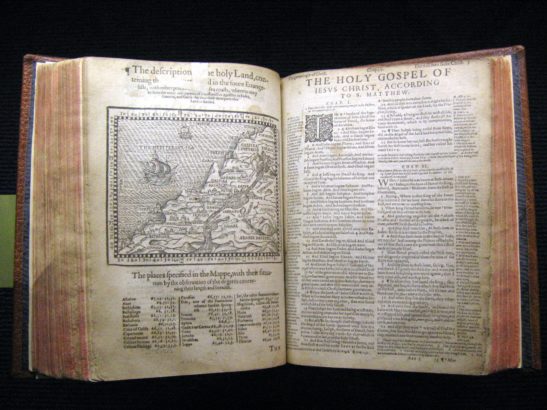Geneva Bible 1560 edition
Many Christians don’t know what the Bible says about Israel and God’s chosen people; many others think they know. Both groups owe themselves an honest look at the themes and patterns of the Bible as a whole, which might reveal a few surprises.
By Kathryn Shihadah
Nothing matters more to a Christian than aligning with the heart of God; to do this, we must read Scripture with discernment and learn from preachers and teachers who are trustworthy, ethical, and without ulterior motives. Two rules of thumb are “context is crucial” and “Scripture interprets Scripture” — in other words, let the Bible itself tell us what it means.
When it comes to the subject of Israel, two verses are regularly cited (all quotes are from the KJV):
Blessed is he that blesseth thee [Israel], cursed is he that curseth thee. (Numbers 24:9)
and
I will make of thee a great nation, and I will bless thee, and make thy name great; and thou shalt be a blessing. And I will bless them that bless thee, and curse him that curseth thee: and in thee shall all families of the earth be blessed. (Genesis 12:2–3)
Many Christians equate ancient Israel with modern Israel, and understand these verses to mean that as long as a person or nation honors and defends Israel, God will bless that person or nation. Conversely (they believe), if anyone criticizes or disapproves of Israel, God will curse them. Hence, these Christians are careful not to say anything negative about the state of Israel, lest they bring down God’s wrath.
Regarding this belief, they announce, “That’s what the Bible says, so I believe it.”
But in reality, that’s not what the Bible says – that’s how they interpret what the Bible says.
To be responsible and informed, we must search the Scriptures thoroughly and find out whether this interpretation is correct.
Christians with the above viewpoint may not realize that God has more to say about blessings and curses and about the land that He promised to His people.
(If you are new to the subject of modern Israel, please note: mainstream media often has a political agenda on this topic and will not report with balance or accuracy about Israeli actions. Objective information can be found in reports by nonpartisan groups such as the International Red Cross, Christian Aid, Defense for Children International, the Israeli organization B’Tselem, and others.)
 Blessing and cursing
Blessing and cursing
Let’s examine the passages quoted above, “Blessed is he that blesseth thee [Israel], cursed is he that curseth thee” (Numbers 24:9) and “I will bless them that bless thee, and curse him that curseth thee” (Genesis 12:3). The verses carry similar meanings, although one is referring to the whole people of Israel and the other to Abraham.
First we must acknowledge that modern Israel is somewhat removed from ancient Israel. Today’s state was founded by secular Zionists in 1948 over the objections of many religious Jews and Christians. Its founders almost named the state “Tzabar” (or “Sabra,” a Hebrew word meaning a Jew born in Israel), and it was almost located in Argentina.
But if we give modern Israel the benefit of the doubt, and assume that these passages do apply, we need to implement the “context is crucial” and “Scripture interprets Scripture” rules to find out what they really mean.
(Some Christians and their pastors are influenced by a version of the Bible annotated by a man named Cyrus Scofield. Since Scofield, it turns out, was a shady character and the circumstances of his Bible’s publication questionable – see the references below – it’s best to read not his commentary on the Bible, but the Bible itself to see what it says.)
The context of the blessing and cursing verses
A study of the context of Numbers 24 is essential to understanding the meaning of verse 9. Just a few chapters before Balaam the diviner spoke those words, the Israelites had sinned and God had sent “fiery serpents” that killed many of them (see Numbers 21:4-9). One chapter after Balaam’s statement, the people sinned again, and God set in motion a plague that killed 24,000 Israelites (Numbers 25:1-9).
God’s blessing did not give Israel carte blanche: when necessary, it included reprimand and discipline. More will be said about this below.
God’s words to Abraham (Genesis 12:3) do indicate that God wanted Abraham to be blessed – but twice in the passage God expressed the main point: not that Abraham should receive blessings, but that he should be a blessing to others. In other words, the covenant was not for the sake of Israel, but for the sake of God’s holy name in the earth, among all peoples.
Question: Is modern Israel bringing glory to God?
More Scriptures on blessing and cursing
If we look at other passages about blessing and cursing – that is, if we let Scripture interpret Scripture – we can see that third-party blessings and curses on Israel are a minor issue to God.
We’ll start with blessing. Throughout the Old and New Testaments, God tells us that His blessing follows those who put their trust in Him. Here is a sampling:
Blessed is the man that trusteth in the Lord, and whose hope the Lord is. For he shall be as a tree planted by the waters, and that spreadeth out her roots by the river. (Jeremiah 17:7-8)
O taste and see that the Lord is good: blessed is the man that trusteth in him. (Psalm 34:8)
Blessed are the poor in spirit…Blessed are they who mourn…Blessed are the meek…those who hunger and thirst for righteousness…the merciful…the pure of heart…the peacemakers…the persecuted. (Matthew 5:3-10)
What do “blessing” and “curse” mean?
When we bless someone, we are calling upon God to make the object of the blessing successful in fulfilling God’s best intentions for them.
Conversely, to curse someone is to seek their failure or ill fortune as they persist in their sin. (Note that “curse” is not the same as “criticize.”)
Some Christians accuse the United Nations of “cursing Israel” because it passes resolutions condemning Israel’s treacherous, cruel actions toward Palestinians. Many of these same Christians support Israel or pro-Israel politicians financially, believing this will “bless Israel.”
 Another way to look at blessing and cursing Israel
Another way to look at blessing and cursing Israel
Consider the possibility that blessing and cursing Israel might be exactly the opposite of what many Christians believe.
To “bless” someone is to desire their success in fulfilling God’s best intentions for them.
To “bless” Israel is to desire its success in fulfilling God’s best intentions for that nation. If Israel as a whole is not doing God’s will, critical voices should be welcomed, as they might stimulate repentance and reformation.
To “curse’ someone is to seek their failure as they persist in sinning.
To “curse” Israel is to seek its failure as it continues its sinful actions – that is to seek that it be disciplined. One way to contribute to Israel’s failure is to simply remain silent about its transgressions. Left to its own devices, Israel would eventually self-destruct.
Those who criticize Israel’s conduct, then, are taking constructive action; those who do not, are complicit in its possible downfall.
(Entire chapters of the Old Testament — for example, Deuteronomy 28 — support this “role reversal” of blessing and cursing.)
Truth-telling
Silence gives permission to the perpetrator of evil, and flattery emboldens it. When we see Israel — or any other country — acting unjustly, God expects us to speak the truth for the sake of justice and peace:
These are the things that ye shall do; Speak ye every man the truth to his neighbor; execute the judgment of truth and peace in your gates. (Zechariah 8:16)
Study to shew thyself approved unto God, a workman that needeth not to be ashamed, rightly dividing the word of truth. (II Timothy 2:15)
The idea that God would want us to be silent and therefore, complicit in human rights violations against the Palestinian people does not line up with the message of the Bible – does it?
“Keep the way of the Lord”
If we keep reading past the blessing and cursing passage in Genesis 12, we find something that may surprise some Christians: God’s covenant with Abraham had an “obedience clause”:
For I know him, that he will command his children and his household after him, and they shall keep the way of the Lord, to do justice and judgment; that the Lord may bring upon Abraham that which he hath spoken of him. (Genesis 18:19)
(Other verses on the subject include Deuteronomy 30:17-20, Zephaniah 1:4-6.)
Read that again – “do justice…so that…” God’s blessing to Abraham and his descendants was conditional. God wasn’t kidding.
When Abraham’s tribe later became enslaved in Egypt. Moses was tasked with leading the Israelites out of bondage and into the Promised Land, but they sinned again and again along the way.
Eventually, God had enough. True to the covenant, God prohibited the first generation of Israelites from entering the Promised Land (see Numbers 13-14).
Forty years later, that faithless generation had died off (see Hebrews 3:16), and the Israelites prepared again to enter the Promised Land. Moses reminded them:
When thou shalt beget children, and children’s children, and ye shall have remained long in the land, and shall corrupt yourselves…ye shall soon utterly perish from off the land whereunto ye go over Jordan to possess it…And the Lord shall scatter you… (Deuteronomy 4:25-27)
The only way to return to the land was through repentance and obedience:
…even in the latter days, if thou turn to the Lord thy God, and shalt be obedient unto his voice…he will not forsake thee, neither destroy thee, nor forget the covenant of thy fathers which he sware unto them…Keep his decrees and commands…that you may live long in the land the Lord your God gives you for all time. (Deuteronomy 4:30, 40)
Notice the phrase “for all time.” God gave the land for all time, but the people might not inhabit the land for all time. Obedience was mandatory for living on the land.
God summed up His covenant with these words:
See, I have set before thee this day life and good, and death and evil; In that I command thee this day to love the Lord thy God, to walk in his ways, and to keep his commandments…and the Lord thy God shall bless thee in the land whither thou goest to possess it…But if thine heart turn away…ye shall not prolong your days upon the land…I call heaven and earth to record this day against you, that I have set before you life and death, blessing and cursing: therefore choose life, that both thou and thy seed may live.(Deuteronomy 30:15-19)
and
That which is altogether just shalt thou follow, that thou mayest live, and inherit the land which the Lord thy God giveth thee. (Deuteronomy 16:20)
(For details of blessings and curses, read Deuteronomy 28-30.)
Question: is modern Israel keeping the way of the Lord?
 Israel’s cycle of sin
Israel’s cycle of sin
The Israelites settled in their Promised Land, but as Moses predicted, they got into a cycle of disobedience and coming under God’s judgment.
Each time, God would raise up a judge to bring them to repentance. Peace and obedience would be restored — until the cycle invariably started again. (For example, read Judges 2.)
Eventually, the Israelites asked for a king so they could be like the other nations. God obliged them. About 120 years and three kings later (Saul, David, and Solomon), things fell apart. The kingdom split into two (Israel in the north, Judah in the south), and each had its own cycle of disobedience and judgment, followed by prophets who preached repentance. (For example, read 2 Kings 17.)
Question: Are Israel’s leaders administering their country in a way that glorifies God?
Exile and return – inclusivity
God’s covenant promised that the Israelites would be removed from the Promised Land if their sin was too great. Jeremiah reminded them:
[For twenty-three years]…the Lord hath sent unto you all his servants the prophets, rising early and sending them; but ye have not hearkened, nor inclined your ear to hear. They said, ‘Turn ye again now every one from his evil way, and from the evil of your doings, and dwell in the land that the Lord hath given unto you and to your fathers for ever and ever,’…Yet ye have not hearkened unto me. (Jeremiah 25:3-7)
Jeremiah also told the people how they could be restored to the land:
Then shall ye call upon me, and ye shall go and pray unto me, and I will hearken unto you. And ye shall seek me, and find me, when ye shall search for me with all your heart. And I will be found of you, saith the Lord…and I will bring you again into the place whence I caused you to be carried away captive. (Jeremiah 29:12-14)
God also made it clear that when the Israelites returned, anyone of any race who “held fast” to the covenant would enjoy God’s blessing. The covenant would not be limited to the physical descendants of Abraham, Isaac, and Jacob.
For example, Isaiah said,
Neither let the son of the stranger, that hath joined himself to the Lord, speak, saying, The Lord hath utterly separated me from his people.”…Also the sons of the stranger, that…taketh hold of my covenant; even them will I bring to my holy mountain…for mine house shall be called an house of prayer for all people. (Isaiah 56:3, 6–7)
Questions: Is modern Israel in a place of obedience? Does modern Israel welcome all people to pray together?
THE NEW TESTAMENT
Throughout the New Testament, God cherished faithfulness, not ethnicity. Remember that even Jesus came from a mixed bloodline — his lineage includes Rahab and Tamar the Canaanites, and Ruth the Moabite (see Matthew 1:5).
John the Baptist reminded the Pharisees that pedigree is meaningless without obedience:
Bring forth therefore fruits meet for repentance: and think not to say within yourselves, ‘We have Abraham to our father.’ (Matthew 3:8-9)
The whole example of Jesus’ life and death show that “chosen-ness” consists not of entitlement or privilege, but of submission to God and service to humankind.
He spent his time with people whom the Jewish leaders saw as untouchable: a woman with a hemorrhage (Mark 5:24-34), a Samaritan woman (John 4:1-26), a demoniac (Mark 5:1-15), tax collectors (Matt. 9:9-13), and even a woman caught in adultery (John 8:1-11). Jesus illustrated God’s love and forgiveness for all people, not just a “chosen” few.
In the Beatitudes, Jesus was clear about who belongs to the family of God – and it is not a matter of physical bloodline:
Blessed are the peacemakers for they shall be called children of God. (Matthew 5:9)
In one of his parables, Jesus defined the truly “righteous” as those who care for the needy:
For I was an hungred, and ye gave me meat: I was thirsty, and ye gave me drink…Verily I say unto you, Inasmuch as ye have done it unto one of the least of these my brethren, ye have done it unto me. (Matthew 25:35, 40)
Questions: is modern Israel an inclusive place, or exclusive? As a whole, is it built on peacemaking and compassion?
Peter resisted God’s inclusive mercy at first, but ultimately came to understand that God’s heart is for all people:
Of a truth I perceive that God is no respecter of persons: but in every nation he that feareth him, and worketh righteousness, is accepted with him. (Acts 10:34–35)
The Epistles echo the same message: God’s “chosen people” are those who embrace the covenant of faith and obedience, not those of mere physical bloodline:
For they are not all Israel, which are of Israel; neither, because they are the seed of Abraham, are they all children…the children of the promise are counted for the seed. (Romans 9:6–9)
Even as Abraham believed God, and it was accounted to him for righteousness. Know ye therefore that they which are of faith, the same are the children of Abraham. And the scripture, foreseeing that God would justify the heathen through faith, preached before the gospel unto Abraham, saying, In thee shall all nations be blessed. So then they which be of faith are blessed with faithful Abraham. (Galatians 3:6-9)
There is neither Jew nor Greek, there is neither bond nor free, there is neither male nor female: for ye are all one in Christ Jesus. (Galatians 3:28)
For he is our peace, who hath made both [Jews and Gentiles] one…for to make in himself of twain one new man, so making peace, that the Gentiles should be fellow heirs. (Ephesians 2:14-16, 3.6).
Question: Does modern Israel resemble “Abraham’s offspring” according to these descriptions?
CONCLUSION
From a survey of the Old and New Testament context, we can conclude that there has always been only one people of God: not an ethnic group, but those who believe in God and submit to His will. The people of modern Israel would qualify as “God’s chosen people” if they believe in Him and submit to His will, just like the people of any other country.
The name and the location of the country, and the ethnicity of its people, are irrelevant to chosen-ness and blessing.
WHAT IF I STILL BELIEVE MODERN ISRAEL IS GOD’S PROMISED LAND TO THE JEWS?
If God’s covenant with Abraham applies to the modern state of Israel (“the Jewish State”), and God brought the Jewish people to the land to keep His promise, then the obedience clause of the covenant (see Genesis 18:19) must apply to the people there today.
If one of the prophets were to visit Israel today, the prophet would see, for example, that
• 65% of the Jewish population is non-religious (1 Chronicles 16:29)
• The poor – especially poor Palestinians – are routinely treated unjustly (Leviticus 19:15)
• Israel is one of the most militarized states in the world (Ezekiel 33:26)
• Property boundaries and property rights of Palestinians are ignored (Deuteronomy 19:14, Leviticus 19:11)
• Innocent people – Palestinians in particular – are killed (Exodus 20:13)
• Trees belonging to Palestinians are routinely destroyed (Deuteronomy 20:19-20)
• Israeli leaders have been disgraced (1 Kings 2:2-4, 1 Kings 11)
• Minorities — including Jews of color — are oppressed (Leviticus 19:33-34)
 In short, if an Old Testament prophet walked through Israel today–its (illegal) settlements, prisons, military headquarters, and Israeli-controlled Palestinian slums–he could find enough material for an old fashioned fire and brimstone sermon.
In short, if an Old Testament prophet walked through Israel today–its (illegal) settlements, prisons, military headquarters, and Israeli-controlled Palestinian slums–he could find enough material for an old fashioned fire and brimstone sermon.
God would have ample evidence to demand repentance or eviction.
When ancient Israelites took advantage of widows, orphans, strangers, and the poor, the Hebrew prophets spoke out – criticizing their actions and the condition of their hearts. This was not “cursing,” but exhortation for the good of the nation.
Those who love modern Israel — especially those who believe its people are chosen — should likewise care enough to speak up about its sinful actions and policies, so that Israel might repent before God once again drives them out of the land.
WHAT ABOUT ANTI-SEMITISM?
Some people believe that while Israel is a secular state, criticism of Israel’s policies is criticism of Judaism, and is therefore anti-Semitic. But there is a distinction between the state and the religion of (some of) its people. As a political state, Israel is subject to moral criticism just as other states are.
It is essential that we make a separation between the Jewish people and the Jewish State. Many Jews, including some Israeli groups, have declared “not in my name” in regards to the actions of Israel.
For a one-page synopsis of this article go here.
Kathryn Krause Shihadah is a Christian raised in the Lutheran denomination in Illinois, where her parents owned a Christian bookstore. She attended Christian schools, including college, where she received intensive Bible instruction, and has continued these studies throughout her adult life. This survey incorporates material from ChristianZionism.org (endorsed by Brian McLaren and Walter Bruggemann), Faith in the Face of Empire by Palestinian pastor Rev. Dr. Mitri Raheb, God’s Land On Loan by W. Eugene March, Whose Land? Whose Promise? by Gary Burge, and conversations with clergy from several denominations.
Her particular interest in Scripture as it relates to the Holy Land was sparked by her husband Ziyad, a Gazan refugee who asked her the simple but penetrating question, “why do Christians seem to hate Palestinians?”
She is staff writer for If Americans Knew. She blogs at Palestine Home.
RECOMMENDED RESOURCES FOR INDIVIDUAL OR CORPORATE CHRISTIAN STUDY:
Brueggemann, Walter. Chosen? Reading the Bible Amid the Israeli-Palestinian Conflict. Louisville, KY: Westminster John Knox Press, 2015.
Burge, Gary. Jesus and the Land: The New Testament Challenge to “Holy Land” Theology. Grand Rapids, MI: Baker Academic, 2010.
Braverman, Mark. Fatal Embrace: Christians, Jews, and the Search for Peace in the Holy Land. Austin, TX: Synergy Books, 2010.
Kairos Palestine: A Moment of Truth, A Word of Faith, Hope and Love from Palestinian Suffering, 2009, Kairos Palestine – A Moment of Truth
Mulhall, John W. CSP. America and the Founding of Israel. Los Angeles, CA: Deshon Press, 1995
Raheb, Mitri. The Cross in Contexts. Maryknoll, NY: Orbis Books, 2017.
Raheb, Mitri. Faith in the Face of Empire. Maryknoll, NY: Orbis Books, 2014.
Rosen, Brant. Wrestling in the Daylight: A Rabbi’s Path to Palestinian Solidarity. 1st edition, 2012; 2nd edition, 2017.
Sizer, Stephen. Zion’s Christian Soldiers? The Bible, Israel and the Church. Nottingham, England: Inter-Varsity Press, 2007.
Wagner, Donald E. Anxious for Armageddon: A Call to Partnership for Middle Eastern and Western Christians. Scottdale, PA: Herald Press, 1995.
Weir, Alison. Against Our Better Judgment: The Hidden History of How the U.S. Was Used to Create Israel. Createspace, 2014.
DISPENSATIONALISM AND THE SCOFIELD REFERENCE BIBLE
An interpretation of the Bible that has been extremely significant in U.S. support of Israel is known as “dispensationalism.” This theology has been addressed by diverse individuals representing a variety of theological positions who consider it to be a dangerously distorted interpretation of Scripture.
Below are some of those who dispute its tenets and, in some cases, discuss how beliefs that were originally held by an extremely small, marginal group were spread to the United States.
Article: The Scofield Bible—The Book That Made Zionists of America’s Evangelical Christians
Video: The Truth about “Dr” Cyrus Scofield – by TruNews
Article: Dispensationalism and the Eclipse of Christ (An Open Correspondence)
Book: Mauro, Philip. The Gospel of the Kingdom: An Examination of Modern Dispensationalism, 1927.
Book: Gerstner, John H. Wrongly Dividing the Word of Truth: A Critique of Dispensationalism, Nicene Council; 3rd edition, 2009
___________
While IAK doesn’t necessarily endorse all the views that may be held by those listed above, we feel it is useful for readers to be aware of this body of work, most of it from within the Evangelical movement and little known to the general public.
Our operations are funded solely by generous individuals like you. Your contribution will help us continue shining a light on the Israel/Palestine situation and the U.S. connection.
DONATE




